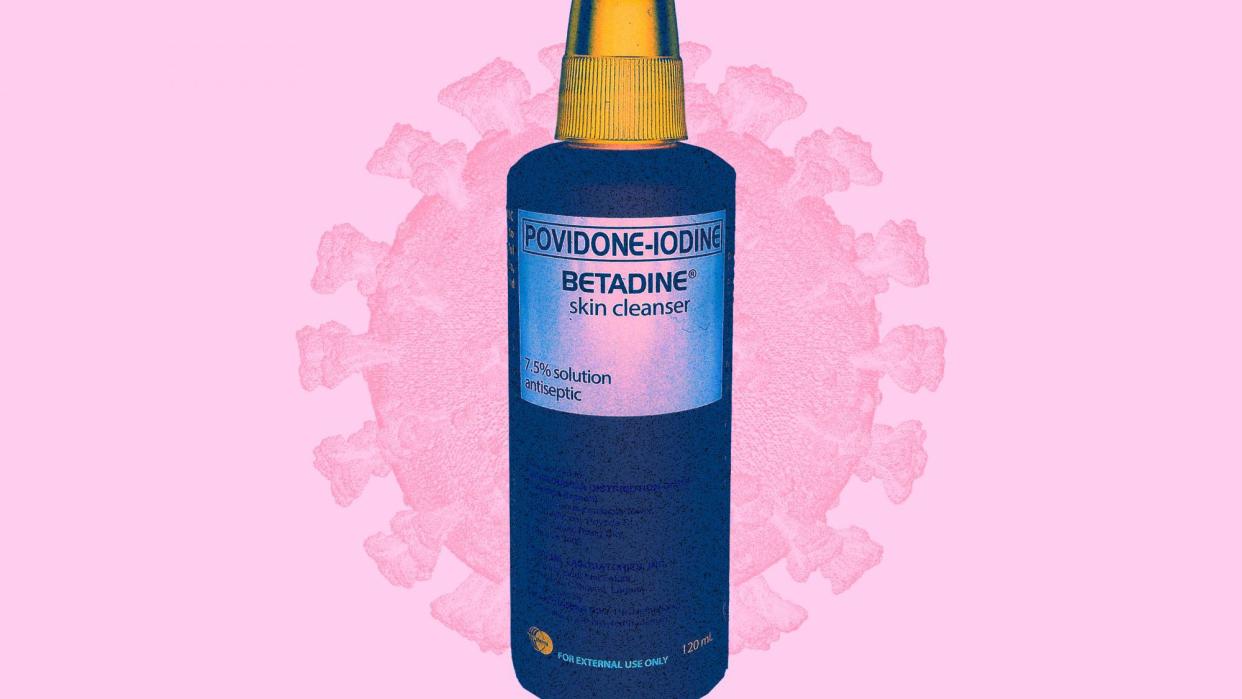Why You Shouldn't Gargle Betadine to Combat COVID-19, According to Experts

AdobeStock
It seems like only yesterday the Food and Drug Administration was warning the public against using Ivermectin to prevent COVID-19. And while the actual COVID-19 vaccines remain the best bet in protecting yourself and your loved ones against the virus, it seems there's another troubling treatment trend emerging.
Betadine, a brand name for the chemical compound povidone-iodine, has become the latest substance to raise eyebrows in the medical community, as some folks have reportedly turned to the product to prevent COVID-19. Betadine is typically used as a topical antiseptic for cuts, scrapes, and burns. The company also makes a less potent version of the product, Betadine Sore Thorat Gargle, that's used to ease sore throat symptoms.
To no one's surprise, social media appears to have played a role in introducing Betadine to the COVID-19 conversation. In fact, some Twitter users, for example, have posted about gargling with Betadine as a preventative measure or as a treatment for COVID-19. The company behind Betadine, however, has urged against using its products to treat, prevent, and/or kill the coronavirus. (Read more: What to Do If You Think You Have COVID-19)
"Betadine Antiseptic First Aid products should only be used to topically treat minor cuts, scrapes, and burns. The First Aid products should not be used as a gargle. Betadine Antiseptic products have not been demonstrated to be effective for the treatment or prevention of COVID-19 or any other viruses," states the company on its official site.
Although there is some research available online analyzing potential links between gargling povidone-iodine and the reduction of viral loads, William Schaffner, M.D., professor of infectious diseases at Vanderbilt University Medical Center, says that just because there have been success stories in laboratory studies doesn't mean that can translate IRL. "There actually have been a few very simple laboratory studies showing that Betadine, this fancy iodine, can kill certain strains of COVID," he says. "That's a laboratory phenomenon. That doesn't translate directly to effectiveness in prevention, and many people don't understand that. The history of medicine has plenty of examples of things that looked good in the laboratory but never worked out when we translated them to human beings in the real world. Although Betadine works in the laboratory, we don't know that it works in the throat."
Dr. Schaffner also says there are several reasons why Betadine wouldn't be successful in killing COVID in the body. For starters, "you actually inhale viruses beyond the throat down into the lungs, and you don't want Betadine down in your lungs," he explains. Second, "if you think it may work, how often will you have to do this? Hourly? Before you go to the concert or the bar? Before you have a date? What's your dosing interval?" adds Dr. Schaffner. "We have no idea because A) we don't know it works, and B) we don't know how frequently you have to do it to make it work." Related: How to Tell the Difference Between COVID-19 and Seasonal Allergies
For Betadine's intended purposes, Dr. Schaffner says it's great. "Aficionados will say, 'Oh, you use it in surgery,'" he notes. "But we use it in a formulation that stays on the skin and gives prolonged protection against surgical wound infections which are caused by bacteria, not viruses. The studies have been done that show it works for that specific purpose, the data is very conclusive."
Beyond Betadine being ineffective against COVID-19, Dr. Schaffner says there are some particularly unsavory risks involved if ingested. "It's not a four-alarm warning, but it is a caution: You want to avoid swallowing this product because it can upset your intestinal tract and make you nauseous," advises Dr. Schnaffer. "It can also cause vomiting and diarrhea." Even scarier? Ingesting large quantities can even cause kidney failure and acidosis, or a build-up of acid in the bloodstream.
In addition to the risks of swallowing Betadine, there are risks to inhaling it, says Andrew Noymer, M.D., an associate professor of population health and disease prevention and public health at the University of California Irvine. "I do worry, in particular, about people misting povidone-iodine into their nasal passages," says Dr. Noymer. "The sinuses are close to the brain, and I worry about the migration of iodine into the central nervous system...please don't go putting chemicals up into the nasal and sinus passages that don't belong there."
In short, getting vaccinated is still the best preventative measure against contracting COVID-19. "Betadine usage is a vast unknown, and it seems a very strained way to avoid vaccination," says Dr. Schnaffer. "It's certainly no replacement for vaccination. That's very, very important. With vaccines, we've given over 600 million doses in the U.S. already, so we know how well it works. We know nothing about Betadine or how well it works." Related: Everything You Need to Know About COVID-19 Vaccine Side Effects
Dr. Noymer adds, "I cannot emphasize enough that an ounce of prevention is worth a pound of cure. Get vaccinated and wear a mask outside the home." If online chatter has you curious about Betadine, simply listen to the experts. Although the internet may be home to some misinformation, the best way to keep you and others safe is to roll up your sleeve and get a COVID-19 vaccine when eligible.
The information in this story is accurate as of press time. As updates about coronavirus COVID-19 continue to evolve, it's possible that some information and recommendations in this story have changed since its initial publication. We encourage you to check in regularly with resources such as the CDC, the WHO, and your local public health department for the most up-to-date data and recommendations.

